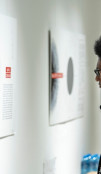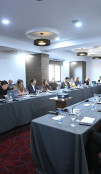Why Monitoring Social and Online Media Matters

The work of Democracy for Development (D4D) extends beyond data collection. By shining a light on harmful trends in political discourse, D4D contributes to a culture of accountability and respect in Kosovo’s electoral process. Social and online media monitoring helps identify patterns of abuse, disinformation, and bias, enabling civil society, media, and political actors to respond effectively.
Equally important, the findings highlight areas where more effort is needed. Gender disparities in candidate coverage, persistent hate speech, and the spread of misinformation are not just campaign issues; they are democratic challenges. Addressing them requires coordinated action from all stakeholders.
A Collective Commitment to Responsible Online Communication
The Democracy for Development Institute (D4D), in collaboration with the Centre for Humanitarian Dialogue (HD Centre), has launched an important initiative to monitor Kosovo’s 2025 Local Elections. This partnership reflects the growing need to ensure fair, transparent, and accountable political processes in the digital age, particularly in an environment where online discourse can heavily shape public opinion.
The foundation of this effort is the Code of Conduct for the Responsible Use of Social Media During the 2025 Local Elections, which builds upon earlier commitments made during the 2021 Local Elections and the 2025 National Elections. The document, endorsed by eight political parties, five media outlets, and nine civil society organisations, sets a framework for responsible online communication.
By signing this code, the parties pledged to avoid hate speech, misinformation, personal attacks, and other harmful practices in digital spaces. It represents a collective step toward safeguarding the integrity of the campaign and protecting democratic values in Kosovo.

EU in Kosovo
Scope of Monitoring
During the 2025 Local Elections, D4D is monitoring 14 municipalities, covering both mayoral and municipal council races. Among the 95 mayoral candidates, 80 are men and only 15 are women, highlighting persistent gender disparities in political representation. At the municipal council level, there are 2,691 candidates.
In parallel, D4D is observing 125 online portals, including 107 Albanian-language and 18 Serbian-language outlets. The monitoring has two main objectives: Identifying hate speech and discriminatory content targeting candidates, and analysing media visibility by tracking mentions of candidates in online coverage.
This dual focus allows D4D to measure both the tone of online discourse and the visibility candidates receive in the media.

EU in Kosovo
Gender-Based Disinformation and Hate Speech
A crucial area of concern is hate speech and gender-based disinformation, which disproportionately target women candidates. D4D’s research shows that such attacks intensify during election campaigns and often focus less on women’s political views or competencies, and more on their personal lives, appearance, or gender stereotypes.
This not only undermines women’s credibility as political actors but also discourages their participation in public life, reinforcing structural barriers to gender equality in politics.
Findings from the Pre-Campaign and Campaign Period
Even before the official campaign period began, online spaces displayed troubling patterns. D4D identified cases of inappropriate content, reaffirming the need for proactive monitoring as the campaign unfolded.
To date, 109 instances of inappropriate language by political representatives on social media have been documented. These findings illustrate the vulnerability of digital spaces to harmful rhetoric, particularly during heated electoral contests.
Using the Pikasa platform, these incidents were categorised and analysed to assess both the content and their political implications. Beyond hate speech, D4D’s monitoring has also revealed apparent gender gaps in media visibility. Men receive disproportionately higher coverage compared to women candidates.

EU in Kosovo
Looking Ahead
As the 2025 Local Elections progress, D4D will continue its monitoring efforts, providing weekly updates and in-depth analysis. These reports are publicly available on D4D’s website, serving as valuable resources for journalists, researchers, and citizens seeking a deeper understanding of the campaigns’ dynamics.
Ultimately, the goal of this initiative is not only to monitor but also to foster more inclusive and respectful political debate in Kosovo. By holding stakeholders accountable and empowering voters with accurate information, D4D seeks to ensure that elections remain fair, transparent, and representative in the digital age.





